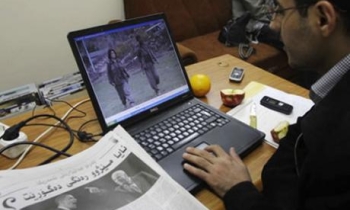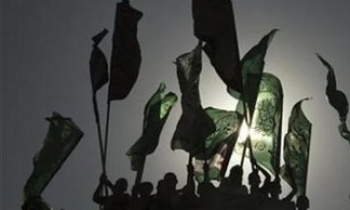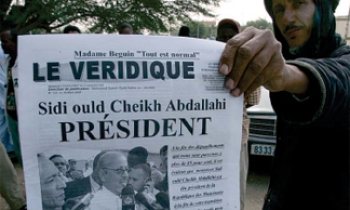BEIRUT: Ghassan Tueni, dean of the Arab media whose anti-Syrian journalist son was assassinated last week, has become for many Lebanese a symbol of national survival in the face of adversity. "Ghassan Tueni is like Job, but a stoic and warrior Job," prominent writer and journalist Elias Khoury told AFP as he described the 79-year-old former government minister, MP and diplomat who owns the prestigious An-Nahar newspaper. "But contrary to Job ... he fights back," he said. In the Bible, Job was a righteous man whose faith in God survived the test of repeated calamities, including the loss of his children and his kingdom in today's Syria - which many accuse of his son Gebran's killing.
Tueni's life has seen a series of personal tragedies.
He first lost his seven-year-old daughter Nayla to cancer, which later took the life of his wife, famous poet Nadia Tueni, before his eldest son Makram was killed in a car accident.
Tueni lost his last child with the killing of Gibran, the An-Nahar chairman and director general who recently became an MP at the end of a long career in journalism during which he was a virulent critic of Syria's presence in Lebanon.
On the night of his son's murder on December 12, a stoic Tueni told weeping journalists in the An-Nahar newsroom: "It is not the time for tears, but for action. Everyone has to work, An-Nahar has to hit the newsstands tomorrow."
Two days later, Tueni drew tears of admiration when he braved his own immense grief to urge the Lebanese to rally around his son's quest for Lebanese sovereignty and unity among Christians and Muslims.
He turned the first days of condolences into a political forum and worked on trying to ease differences that prompted ministers of the Shiite Muslim groups Hizbullah and Amal to suspend their participation in the government.
He visited powerful Parliament Speaker and Amal movement chief Nabih Berri before meeting with Prime Minister Fouad Siniora - a former aide to ex-premier Rafik Hariri whose assassination in February started the protests that forced Syria to end its 29-year presence in Lebanon.
Hizbullah chief Hassan Nasrallah also called Tueni, who asked him to help preserve the country's unity in the midst of rising confessional tension.
And from Syria, the highest Sunni Muslim authority hailed Tueni's Arab nationalism.
Tueni has refused to directly accuse Syria without evidence, but he has decided to sue the Syrian information minister and Damascus' ambassador to the United Nations for slander.
An independent Syrian source which did not wish to be identified told AFP that Tueni was playing a 'dangerous game' because his son's killers want to silence the newspaper which had been a platform to criticize Arab autocratic regimes.
"They killed (prominent An-Nahar editorialist) Samir Kassir in June, and now Gebran, but if Ghassan continues his fight his life would be in danger because for the killers, the viper could still bite if it is not decapitated," he said.
Syrian opposition activist Mohammad Ali al-Atassi wrote in An-Nahar on Sunday that the daily had "opened its pages to me and other Syrian opposition activists when no other Arab newspaper had the courage to do so."
"I felt guilty when Gebran Tueni became a martyr, just as I felt equally guilty when Samir Kassir became a martyr," he said.
Atassi said: "These two martyrs did not only pay the price for Lebanon's freedom and independence, but also the price of democracy in Syria."
Nawaf Salam, political science professor at the American University of Beirut, said: "Ghassan's strength comes from the fact that he is a disciple of ... the Arab renaissance at the end of the Ottoman Empire when Arab Christians and Muslims called for the end of obscurantism and despotism.
"Ghassan Tueni is a stoic who responds to pain through action. This is how he turned An-Nahar into the most prestigious newspaper of the Arab world, while leading a political career in parallel," he told AFP.
Tueni was one of the leading architects of the 1952 downfall of Lebanon's first post-independence President Beshara al-Khoury, and that of the authoritarian regime of former President Fouad Chehab in 1968.
The veteran diplomat was also Lebanon's ambassador to the United Nations when UN Security Council Resolution 425 was voted after Israel's invasion of the country in 1978. The resolution led to Israel's unconditional pullout from Lebanon, even if 20 years later.









